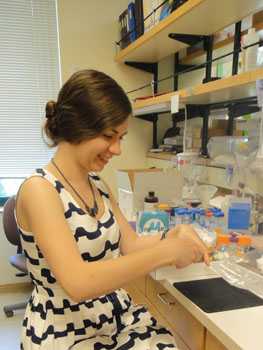Campus News
Getting to the bottom of degenerative muscle disease
Alexandra Houser is this year’s recipient of the prestigious Steck Family Award, which honors the best senior thesis completed during the academic year.

Alexandra Houser has already distinguished herself with her work ethic, her original ideas, and her initiative as a student in UC Santa Cruz’s Molecular, Cell and Developmental Biology (MCD Biology) Department.
Now, Houser (College Eight ’16, MCD biology) is being honored for her dedication and outstanding work; she is this year’s recipient of the prestigious Steck Family Award, which honors the best senior thesis completed during the academic year, with the winner chosen from the Chancellor’s Award candidates.
The Steck is the highest academic award for undergraduate academic achievement at UC Santa Cruz.
Houser, 22, worked under the mentorship of two MCD biology faculty members: professor Bill Saxton and research scientist Inna Djagaeva on the project, which is titled “Editing of Kinesin Heavy Chain to Elucidate its Roles in Neurodegenerative Diseases.”
Djagaeva was unstinting in her praise of Houser: “She’s one of the best students we’ve had,” Djagaeva said. “She is very dedicated and very passionate about research. I almost didn’t have to mentor her at all. After some initial training, she could do many things on her own.”
Djagaeva also praised Houser for going far beyond “simply following directions” by taking initiative and coming up with new ideas that were at the level of high-performing graduate students, and for taking a leadership role and training other students who were working on the project, mentioning that she was “highly qualified” to do the training.
Houser, Saxton and Djagaeva were recognized at the Chancellor’s Undergraduate Awards Luncheon.
Houser worked as a part of a lab that studies the mechanisms and specific proteins that regulate muscle movement. By studying these mechanisms in fruit flies, the team is hoping to come away with a better understanding of degenerative muscle diseases. The lab studies “motor proteins” that transport proteins, mitochondria, and other organelles throughout the body, and how breakdowns in those proteins can lead to degenerative muscle diseases.
Houser’s project focused on using the CRISPR/Cas9 gene editing tool to develop mutations in the common fruit fly that mimic mutations found in patients with neurodegenerative diseases. CRISPR/Cas9 is a recently discovered gene-editing tool that has a higher specificity than any other previously used mechanism. This system is so new, there is still a lot of fine tuning to be done with it. Djagaeva and Houser spent a year optimizing this gene-editing tool that could be used to solve a number of genetic diseases in the future.
And while Houser’s work is extremely complex, her reaction to the reward was very simple and straightforward: She was shocked.
“It was totally out of the blue,’’ Houser said.
UC Santa Cruz has a longstanding tradition of keeping the Steck Award winner’s name a closely guarded secret right up to the last second. Such was the case last week. But Houser thought something a little bit fishy was going on when she saw that Saxton had walked to the podium to introduce the winner.
“I was wondering to myself: Why is he up there, and why is he announcing the winner?”
Soon enough, she found out that his presence up there at the front of the room was no coincidence.
Houser, who hails from Santa Maria, has an interest in sciences that dates back to when she was a little girl. A friend of the family used to take her into fields where Houser would study plants and birds and painstakingly “put owl pellets back together.”
At the time, she had no idea that cellular biology was going to be her favorite topic.
“But I realized, from an early age, that science was going to be really cool.”
Loren Steck (Porter ’73), who sits on UC Santa Cruz’s Board of Trustees, was part of the distinguished selection committee that chose to recognize Houser’s project. The Steck family created the endowment that funds the award.